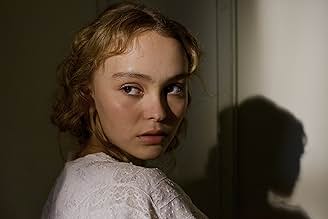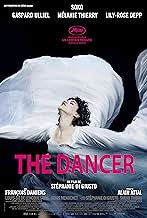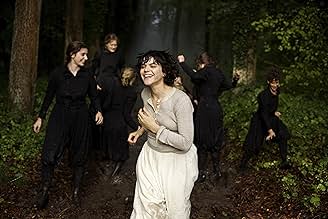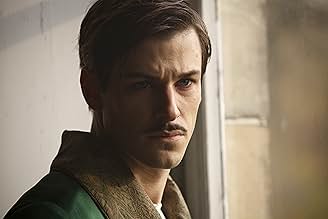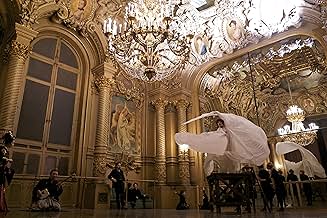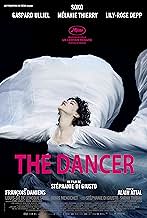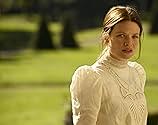NOTE IMDb
6,5/10
2,9 k
MA NOTE
Loïe Fuller était la coqueluche des Folies Bergères au tournant du XXe siècle et une muse pour Toulouse-Lautrec et les frères Lumière. Le film tourne autour de sa relation compliquée avec sa... Tout lireLoïe Fuller était la coqueluche des Folies Bergères au tournant du XXe siècle et une muse pour Toulouse-Lautrec et les frères Lumière. Le film tourne autour de sa relation compliquée avec sa protégée et rivale Isadora Duncan.Loïe Fuller était la coqueluche des Folies Bergères au tournant du XXe siècle et une muse pour Toulouse-Lautrec et les frères Lumière. Le film tourne autour de sa relation compliquée avec sa protégée et rivale Isadora Duncan.
- Réalisation
- Scénario
- Casting principal
- Récompenses
- 1 victoire et 16 nominations au total
William Houston
- Rud
- (as Will Houston)
Matilda Kime
- L'assistante de Louis
- (as Mathilda Kime)
Avis à la une
The body as art is not hinted, it's the piece. This indulgence in the sensual somehow does not invite perversion. The effect is it's wholly performance authorial, a complete integration of performer and role, which happens just once in a blue moon. She almost dies each time, like a birth effect, same time it brings a cinema of transcendence. And maybe the french would roll their eyes and say, can't believe he fell for our tricks. That she's bringing the effect of the bad girl. But it sees no difference between her, her dance, the cinema. The film could be science fiction, like she is some techno-bird, cranking the levers, the lights, the darkness she emerges under spotlight, her dance like a ritual for the space gods; it's all very steampunk, but where here the era of industrialism begins for great mechanizations to streamline and integrate, so too would be art by the same process, to the same ends but in the way of the ecstatic truth. I'm envious because who ever gets so actualized? You have talents and presences and great ones but rare to actualize within a piece, to see one so wholly expressed where it feels like some endpoint. I sense Soko inspires that like some cinema muse. It's hard to talk about it rationally, same as dance.
Loïe Fuller (real name Mary-Louise), dancer-non-dancer actually choreographer, set designer and creator of theatrical machines based on the innovative use of electric light, fundamentally creative visionary, this last definition suits her in a literary way: all Today's vjs and video-performers should pay tribute to her by recognizing her pioneering in the visual arts as on the other hand, at the beginning of the 20th century, the Lumiere brothers did by immortalizing her in one of their films.
The biopic-film by debut director Stéphanie Di Giusto, inspired by the biographical essay by Giovanni Lista, starts from the state of geographical as well as psychological isolation, in a remote county of Illinois dedicated to cattle breeding, where our heroine lives . Very harsh living conditions among rude cowboys who see Mary-Louise as a "strange" girl who prefers self-acting plays and poems rather than looking after animals. This will lead her to escape and start that wonderful artistic adventure, not without disappointments, with merits that will be recognized already in her life, especially in Europe, in Paris, home of all the avant-gardes of the nascent twentieth century.
Her relationship with Isadora Duncan of which she produced the first appearances on stage is interesting, recognizing her role as a true dancer which she was not, but above all that innovative creativity that she knew well but which will also determine the beginning of her end.
I've seen her in 'Augustine' and was very impressed, I tried to find her other films and they are nowhere...
But this was very very nice, Despite that I watched it with ill-timed subs that were I think three to four scenes behind - I had to endure most of it, wishing I oh so new French but I don't.. it definitely sounds lovely though.. lol
But in the end, I did see some people dislike, I don't know why, I did see some critics give it rotten fruits , you say tomatoe I say tomato, whatever, they claimed the writing took liberties with facts... And another wanted to see so much more, I'm like lady , do you want to chip in the funds it takes to see way way more in a film?
I mean was it not one of the most beautiful things to see? scene after succeeding scene, we are rapt with surge of euphoria at how beautiful everything is, it was very cool, and if it did not do justice to the dancer protagonist here on earth, I'm sure if she is not here, she is somewhere else, surely saying, 'dang, that was a fine fine piece of beautiful film making!'
But this was very very nice, Despite that I watched it with ill-timed subs that were I think three to four scenes behind - I had to endure most of it, wishing I oh so new French but I don't.. it definitely sounds lovely though.. lol
But in the end, I did see some people dislike, I don't know why, I did see some critics give it rotten fruits , you say tomatoe I say tomato, whatever, they claimed the writing took liberties with facts... And another wanted to see so much more, I'm like lady , do you want to chip in the funds it takes to see way way more in a film?
I mean was it not one of the most beautiful things to see? scene after succeeding scene, we are rapt with surge of euphoria at how beautiful everything is, it was very cool, and if it did not do justice to the dancer protagonist here on earth, I'm sure if she is not here, she is somewhere else, surely saying, 'dang, that was a fine fine piece of beautiful film making!'
Historians have a way of sterilising cinema. So many words are wasted on whether a film is accurate instead of understanding and enjoying film as an artform. The Dancer (2016) is a bio-pic based on the life of Loíe Fuller who pioneered a hybrid dance performance that integrated visual spectacle and physical movement. Historians can fuss over facts, but others will enjoy what is an aesthetically intense story of creative innovation in late 19th Century Paris.
The story opens with Loíe (Soko) raised by her drunken father on a farm in America. A keen reader with a vivid imagination, she dreams of a career as an actress. After her father dies, she uses money stolen from a would-be seducer to cross the Atlantic in search of fame. She stumbles upon a Parisian theatre looking for a performer to fill the stage during interval. As a talented artist with an eye for design, she conceives of a dance act that disguises her modest dancing talent and creates a dramatic serpentine performance using a costume of batons and swirling bedsheets. Her act is immediately popular. Although physically arduous, the performance evolves to using silk, coloured lights, and dramatic music, and suddenly Loíe is the toast of Paris. When the talented teenage dancer Isadora Duncan (Lilly_Rose Depp) joins the troupe, the stress of dancing on Loíe's body, her penchant to overspend, and her emerging sexual ambivalence, all begin to take their toll.
This is a luscious film to watch. Its rich colour palette, top-shelf production values and unconventional characterisations create the dramatic energy which drives the narrative. Undoubtedly, it is Soko's physicality and her acting style that makes this film work. She has an almost androgynous beauty that the camera exploits; in some scenes she appears dashingly handsome, in others, sublimely feminine. With an emotive range that switches effortlessly from ingénue to sophisticate, she transfixes with her gender-free expressiveness, even under the on- screen competitive pressure of the beautiful young Isadora. The serpentine dance performances are mesmerising. They hang in a space somewhere between classical ballet, modern jazz, and a gyrating living sculpture draped in wings of silk accompanied by Vivaldi under spotlights. It's easy to understand their immense popularity as a dramatic innovation in stage performance. Above all else, The Dancer captures this spirit of excitement.
Reading this film as history gets in the way of enjoying it as visual spectacle and engaging narrative. Loíe Fuller was praised by luminaries of her time, such as Yeats, Toulouse-Lautrec, and Rodin, but largely forgotten in her native country. The Dancer is a tribute to an avant-garde artiste whose legacy lives on in theatrical dance effects that have become an artform in their own right.
The story opens with Loíe (Soko) raised by her drunken father on a farm in America. A keen reader with a vivid imagination, she dreams of a career as an actress. After her father dies, she uses money stolen from a would-be seducer to cross the Atlantic in search of fame. She stumbles upon a Parisian theatre looking for a performer to fill the stage during interval. As a talented artist with an eye for design, she conceives of a dance act that disguises her modest dancing talent and creates a dramatic serpentine performance using a costume of batons and swirling bedsheets. Her act is immediately popular. Although physically arduous, the performance evolves to using silk, coloured lights, and dramatic music, and suddenly Loíe is the toast of Paris. When the talented teenage dancer Isadora Duncan (Lilly_Rose Depp) joins the troupe, the stress of dancing on Loíe's body, her penchant to overspend, and her emerging sexual ambivalence, all begin to take their toll.
This is a luscious film to watch. Its rich colour palette, top-shelf production values and unconventional characterisations create the dramatic energy which drives the narrative. Undoubtedly, it is Soko's physicality and her acting style that makes this film work. She has an almost androgynous beauty that the camera exploits; in some scenes she appears dashingly handsome, in others, sublimely feminine. With an emotive range that switches effortlessly from ingénue to sophisticate, she transfixes with her gender-free expressiveness, even under the on- screen competitive pressure of the beautiful young Isadora. The serpentine dance performances are mesmerising. They hang in a space somewhere between classical ballet, modern jazz, and a gyrating living sculpture draped in wings of silk accompanied by Vivaldi under spotlights. It's easy to understand their immense popularity as a dramatic innovation in stage performance. Above all else, The Dancer captures this spirit of excitement.
Reading this film as history gets in the way of enjoying it as visual spectacle and engaging narrative. Loíe Fuller was praised by luminaries of her time, such as Yeats, Toulouse-Lautrec, and Rodin, but largely forgotten in her native country. The Dancer is a tribute to an avant-garde artiste whose legacy lives on in theatrical dance effects that have become an artform in their own right.
A very beautiful film directed with vigor and taste. To classify this film as biopic does not do justice to it and it is even misleading. I read so many ill directed criticism on what is and what is not historically accurate in the movie. Who cares? Who would criticize the Greek poet Kavafy for misrepresenting historical figures in his poems? For me 'The Dancer' is a poetic film on beauty and the passion for creativity and it was a pleasure to watch. For two hours I was immersed in the film's world, relishing every bit of it; the elliptical decor, the unreal almost lighting, the spectacular dance, the energy. Indeed what I liked most was the fact that the film did not make an effort to faithfully reconstruct an era, but rather create its own unique universe combining various elements in a coherent whole. Let alone the amazing amount of work that went into it, the production design, the choreography, the music. The audacious directorial approach is justified by the result. Soko's choice to play Loie Fuller was excellent as she brought into the part her own fierce determination to develop in the show and music business matched with confident and truthful acting. The film is an amazing feat anyway, but even more so as a debut feature.
Le saviez-vous
- AnecdotesElle Fanning was first attached to play Isadora Duncan, but was later replaced by Lily-Rose Depp.
- GaffesLoie first performed at the Follies Bergere in the early 1890s, but the director of the Follies Bergere is driving an "olde tymey" car from perhaps 2 decades later when Loie ambushes him in his carpark in order to present an impromptu audition.
- Bandes originalesDestined For Great Things
Composed by Nick Cave and Warren Ellis
Performed by Nick Cave and Warren Ellis
Meilleurs choix
Connectez-vous pour évaluer et suivre la liste de favoris afin de recevoir des recommandations personnalisées
- How long is The Dancer?Alimenté par Alexa
Détails
- Date de sortie
- Pays d’origine
- Sites officiels
- Langues
- Aussi connu sous le nom de
- The Dancer
- Lieux de tournage
- Opéra de Vichy, 1 rue du Casino, Vichy, Allier, France(scenes in the American theatre)
- Sociétés de production
- Voir plus de crédits d'entreprise sur IMDbPro
Box-office
- Montant brut mondial
- 1 960 510 $US
- Durée1 heure 48 minutes
- Couleur
- Mixage
- Rapport de forme
- 2.39 : 1
Contribuer à cette page
Suggérer une modification ou ajouter du contenu manquant

Lacune principale
By what name was La Danseuse (2016) officially released in India in English?
Répondre
